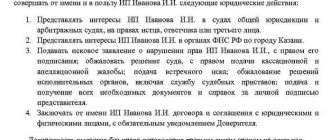Everyone has the right to protect their rights in ways not prohibited by law, in particular, everyone has the right to independently defend themselves in court and represent their interests in government bodies. However, legislation at the present stage of development of the legal system has a rather complex structure, consisting of a large set of interrelated regulations that have their own hierarchy, a certain procedure for application, rather complex and inconsistent, and sometimes contradictory judicial practice. All this leads to the need to attract lawyers who, on a professional basis, provide qualified legal assistance in any, even the most difficult situation.
Who can be a representative in an administrative case, as well as restrictions on representation
Conducting administrative cases in court through a representative increases the chances of the represented person for the most favorable outcome in the case. Thus, Article 54 of the Code of Administrative Proceedings of the Russian Federation (hereinafter referred to as the Code of Administrative Proceedings of the Russian Federation) directly states that a citizen, having administrative procedural capacity, has the right to independently conduct his affairs personally or through representatives.
However, it is not uncommon for citizens to have no or limited legal capacity. In this case, their legal representatives can act as representatives (i.e. persons vested with this right by virtue of the law and who are in a certain relationship or a certain legal connection), namely: parents, adoptive parents, guardians or other persons to whom this right provided by federal law.
Meanwhile, legal representatives have the right to choose another person, preferably a professional lawyer, to represent the interests of the incapacitated person. At the same time, the legislator established a contradictory provision that the CAS of the Russian Federation may provide for cases where the participation of a representative (and not a legal representative) is mandatory. The question arises of what to do in a situation if the child’s parents are professional lawyers, i.e. may well satisfy the requirements for a representative. Can they act as a representative in this case?
A similar procedure for representing interests is provided for those with limited legal capacity.
In the cases listed above, the representative is chosen either by the represented person or the representative is determined by force of law, however, Part 4 of Article 54 of the Code of Arbitration Procedures of the Russian Federation provides for cases, for example, when the issue is being resolved regarding an administrative defendant about hospitalization in a medical organization providing psychiatric care on an involuntary basis, in which the court itself appoints a representative (lawyer).
If we talk about cases where an organization acts as a defendant, then the rights of the latter can be protected by the sole management body of the organization (for example, the general director) or a person authorized by such a body.
If we consider the issue of representing interests in court of public authorities, then here we will talk about the leaders or representatives of these bodies. Article 54 of the Code of Arbitration Procedures of the Russian Federation also presents other cases of representation of interests in administrative matters.
As representatives in an administrative case, in accordance with Article 55 of the CAS of the Russian Federation, there may be lawyers or other persons who have full legal capacity, and are not under guardianship (trusteeship) and have a higher legal education. Thus, it can be seen that the CAS of the Russian Federation was the first to put into practice the limited monopoly of professional lawyers to represent interests in court as representatives.
It is important to note that the legislator does not require legal representatives to have a higher legal education; full legal capacity is sufficient.
CAS RF contains a classic list of persons who cannot be representatives of individuals and legal entities (IP) in court, although they meet the requirements for them. Such persons include judges, prosecutors, investigators and other persons.
On September 15, 2015, the Code of Administrative Procedure of the Russian Federation (hereinafter referred to as the CAS) came into force. It regulates proceedings in cases that arise from public legal relations, as well as in some other categories of disputes.
What misconceptions in connection with the adoption of CAS are encountered in practice? To begin with, I would like to dispel two misconceptions related to the adoption of CAS, which are common among lawyers (and not only among them). 1) the procedure for considering cases that are being considered according to the rules of the CAS since September 15 was previously not regulated at all. Of course, this statement is not true. All cases that are being considered according to the rules of the CAS since September 15 were previously considered according to the rules of the Code of Civil Procedure of the Russian Federation. 2) The CAS establishes the procedure for administering justice in all administrative cases. This is also not true. The CAS does not establish the procedure for considering all cases that are considered in administrative proceedings. Firstly, the CAS does not apply to the procedure for considering cases from administrative legal relations within the competence of arbitration courts (Section III of the Arbitration Procedure Code of the Russian Federation). Secondly, cases of administrative offenses that are within the jurisdiction of courts of general jurisdiction are not considered according to the rules of the CAS. Such cases, as before, are considered according to the rules of the Code of Administrative Offenses of the Russian Federation (CAO RF). Thirdly, the provisions of the CAS do not apply to cases of foreclosure on funds from the budgets of the budget system of the Russian Federation. What cases do courts consider according to the rules of the CAS? All cases that are considered according to the rules of the CAS can be divided into three groups. 1. Cases on the protection of violated or disputed rights, freedoms and legitimate interests of citizens, rights and legitimate interests of organizations that arise from administrative and other public legal relations. As a matter of fact, this is the bulk of cases that are considered according to the rules of the CAS. This includes the following categories of cases: - challenging regulatory legal acts in whole or in part; - on challenging decisions, actions (inaction) of government bodies, other government bodies, military command and control bodies, local government bodies, officials, state and municipal employees; — on challenging decisions, actions (inaction) of non-profit organizations vested with certain state or other public powers, including self-regulatory organizations; — on challenging decisions, actions (inaction) of qualification boards of judges; — on challenging decisions, actions (inaction) of the Higher Examination Commission for taking the qualification exam for the position of a judge and examination commissions of the constituent entities of the Russian Federation for taking the qualification exam for the position of a judge; — on the protection of voting rights and the right to participate in a referendum of citizens of the Russian Federation. 2. Cases that are related to the implementation of mandatory judicial control over the observance of human and civil rights and freedoms, the rights of organizations in the implementation of certain administrative power requirements for individuals and organizations. These are cases: - on the termination of the activities of the media; - on the collection of sums of money to pay statutory mandatory payments and sanctions from individuals; — on the suspension or liquidation of a political party, its regional branch or other structural unit, another public association, religious and other non-profit organization, as well as on the prohibition of the activities of a public association or religious organization that is not a legal entity, on the exclusion of information about a non-profit organization from state register; - on the temporary placement of a foreign citizen who is subject to deportation or readmission in a special institution and on the extension of the period of stay of a foreign citizen who is subject to deportation or readmission in a special institution; • on administrative supervision of persons released from prison; - on the involuntary hospitalization of a citizen in a medical organization providing psychiatric care in a hospital setting, on the extension of the period of hospitalization of a citizen on an involuntary basis, or on an involuntary psychiatric examination of a citizen; — on involuntary hospitalization of a citizen to a medical anti-tuberculosis organization; • other administrative cases on involuntary hospitalization of a citizen in a non-psychiatric medical organization. 3. Cases on awarding compensation for violation of the right to trial within a reasonable time in cases considered by courts of general jurisdiction, or the right to execute a judicial act of a court of general jurisdiction within a reasonable time. Accordingly, applications for these categories of cases, starting from September 15, 2015, are submitted to courts of general jurisdiction and to the Supreme Court of the Russian Federation according to the rules of the CAS. Who can participate as a representative in administrative cases considered under the rules of the CAS The CAS contains new rules on who can act as a representative in administrative cases. Firstly, only persons who have a higher legal education can act as representatives in administrative court (part 1 of article 55 of the CAS). Anyone who does not have a higher legal education cannot represent the interests of his client in an administrative case in a court of general jurisdiction or in the Supreme Court of the Russian Federation. This general rule, according to the literal meaning of the CAS, applies to all types of representation: legal representation, representation on behalf of organizations and state (municipal) bodies. However, if we interpret the provisions of the CAS in their systematic connection with other norms of the code, we can come to the conclusion that there is still one exception to this rule. When a group of people goes to court with a collective administrative claim, if the group members have assigned one or more members of the group to conduct their affairs (Part 3 of Article 42 of the CAS), such a person is not required to have a higher legal education. This is because the person who has been given authority by other class members to conduct their affairs is primarily the plaintiff with the relevant substantive interest. And in order to be a plaintiff in a case, a higher legal education is not required. Thus, in order for a person to participate in an administrative case as a representative, he needs to submit to the court not only documents that confirm his authority and an identity document, but also a diploma of higher legal education. The latter will need to be submitted in original and as a copy. If the representative files a statement of claim instead of the plaintiff, then a copy of the diploma confirming that the representative has received a higher legal education (clause 5, part 1, article 126 CAS) must be attached to it. Such a copy must be properly certified (by the organization that issued it, by a notary, or by another person who has the right to do so). It appears that instead of a diploma, a representative can present to the court a document confirming the award of an academic degree or academic title in the field of law. In addition, if the representative in the case has the status of a lawyer, then it is sufficient to submit a document confirming this status. The fact is that in order to obtain the status of a lawyer, by force of law, it is necessary to have a higher legal education (Clause 1, Article 9 of the Federal Law of May 31, 2002 No. 63-FZ “On advocacy and the legal profession in the Russian Federation”). Secondly, if a person does not want to participate in a case through a representative, he can personally defend his rights in administrative proceedings (as, in fact, in civil proceedings). This traditional rule was also retained by the CAS: in order to personally conduct your own affairs in court, you do not need to have a higher legal education. However, now there is one exception to this rule: in cases of challenging regulatory legal acts. In such cases, citizens can personally conduct their affairs only if they have a higher legal education. Otherwise, citizens can conduct business only through representatives who have a higher legal education. In addition, the CAS retained the previous rule that a power of attorney on behalf of the organization must be sealed (Part 6, Article 57 of the CAS). Previously, a similar rule for civil and arbitration processes was canceled. This rule was retained in the CAS by mistake. Currently, a bill is being prepared to amend the CAS, which will abolish the rule on the mandatory certification of powers of attorney of organizations with a seal. However, before making these changes, powers of attorney issued on behalf of organizations to participate in administrative matters are still recommended to be sealed (of course, if the organization has one). When participants in administrative disputes will be able to submit claims, complaints and other documents to the court via the Internet. CAS provides participants in the process with the opportunity to file claims and complaints electronically. This occurs by filling out a form that is posted on the official website of the court on the Internet, just as this has long been practiced in the arbitration process. Such rules are established in part 2 of article 45, part 8 of article 125, part 7 of article 299, part 3 of article 319, part 4 of article 347 CAS. The CAS also introduces a rule that the court must post information about the acceptance of an administrative claim or complaint for proceedings, about the time and place of a court hearing or the performance of a separate procedural action on its official website on the Internet. The court will be required to do this no later than 15 days before the start of the court hearing or the commission of a separate procedural action, unless otherwise provided in the CAS. Such rules are established in Part 7 of Article 96 of the CAS. In addition, the CAS establishes a rule that persons participating in the case, at their request, have the right to receive copies of judicial acts, notices, summonses and other documents via the Internet (with the exception of documents containing information to which access is limited). These copies will be electronic documents signed by the judge with an enhanced qualified electronic signature. Such rules are established in part 4 of article 45 of the CAS. These provisions came into force on September 15, 2021. How significant are other changes to the CAS in comparison with the previously valid legal regulation? In addition to the above, many provisions of the CAS repeat the provisions of the Code of Civil Procedure of the Russian Federation, with small, insignificant changes. In comparison with the Code of Civil Procedure of the Russian Federation, the CAS regulates differently, in particular, the following issues. 1. The chairman of the court now has the right to make a ruling to speed up the consideration of the case not only at the request of interested parties, but also on his own initiative (Part 6 of Article 10 of the CAS). 2. In the CAS, the general generic concept for decisions, determinations and rulings of courts is “judicial acts” (Part 1 of Article 16 of the CAS), and not “court decisions”, as in the Code of Civil Procedure of the Russian Federation. 3. Rules have emerged for the parties to enter into an agreement based on the circumstances of the case (Article 65 CAS), as in the arbitration process. 4. The CAS regulated the procedure for a group of persons filing a collective administrative claim (Article 42 of the CAS). 5. Measures to secure a claim in the CAS are called measures of preliminary protection, and the procedure for their application is regulated in somewhat more detail... 6. New measures of procedural coercion have appeared: restricting the speech of a participant in the trial or depriving such a participant of the floor (Article 118 of the CAS), as well as an obligation about appearance (Article 121 CAS). 7. The size of court fines has increased. In the Code of Civil Procedure of the Russian Federation, the amount of most fines does not exceed 1 thousand rubles, and the maximum fine in the code is 5 thousand rubles. The CAS establishes that a judicial fine can be imposed in the following amounts: on a state body - up to 100 thousand rubles, on a local government body and other bodies (organizations) with public powers - up to 80 thousand rubles, on organizations - up to 50 thousand rubles, for an official - up to 30 thousand rubles, for a state or municipal employee - up to 10 thousand rubles, for a citizen - up to 5 thousand rubles. (Part 1 of Article 122 CAS). In addition, the number of cases in which the court can impose a judicial fine has increased, and cases have also appeared in which the court is obliged to impose a judicial fine on the person involved in the case. 8. The judge now decides whether to accept an administrative claim for proceedings within three days from the date of its receipt, and not within five, as was previously the case. 9. The CAS has introduced simplified proceedings, that is, a simplified (written) procedure for considering an administrative case without an oral hearing and in a shorter period of time. 10. Chapters have appeared in the CAS that were not previously in the Code of Civil Procedure of the Russian Federation, devoted to the peculiarities of certain categories of cases: • proceedings in cases of challenging the results of the cadastral value (Chapter 25 of the CAS); • proceedings on cases of collection of mandatory payments and sanctions; • proceedings on cases considered by the Disciplinary Board of the Supreme Court of the Russian Federation; • proceedings on cases of suspension or liquidation of a political party, termination of the activities of the media. 11. In certain cases, shortened deadlines have been established for filing appeals (parts 2–6 of Article 298 CAS), as well as shortened deadlines for consideration of complaints in the court of appeal (parts 3–10 of Article 305 CAS). 12. The appellate court received the right in certain cases to cancel the appealed court decision and send the case for a new trial to the court of first instance. 13. An application for restoration of the missed deadline for filing cassation and supervisory complaints must now be submitted not to the court of first instance before filing the complaints themselves, as was previously the case, but directly to the court of cassation or supervisory instance.
Registration of powers of a representative
In order for a representative to act on behalf and in the interests of the person represented, his powers must be properly formalized. Thus, legal representatives, by virtue of their position, must present to the court documents confirming their status and powers (birth certificate, decision of the guardianship and trusteeship authority on the appointment of guardianship or trusteeship).
If we talk about the powers of the head of the organization, then his position can be confirmed by submitting to the court the charter of the organization, an order of appointment to the position. If the representative from the organization is not a manager, for example, a staff lawyer or an accountant, then such a person must have a power of attorney, which will be issued by the organization itself and signed by its head or other person authorized for such action and sealed with the seal of the organization.
A power of attorney from an individual entrepreneur is also signed and sealed by the entrepreneur.
For a lawyer, a document confirming the status of a representative will be an order for the execution of an assignment issued by the relevant legal entity or, in some cases, a power of attorney (Article 6 of the Federal Law of May 31, 2002 No. 63-FZ “On Advocacy and the Bar in the Russian Federation,” Part 4 Article 57 CAS RF).
The representative must have documents on education (in this case we are talking about legal education) and documents certifying their authority, i.e. power of attorney.
The CAS of the Russian Federation allows for the possibility of conferring powers on a representative directly at a court hearing through an oral statement.
Part 8 of Article 57 of the CAS of the Russian Federation establishes that a power of attorney issued by citizens to represent their interests in an administrative dispute must be certified by a notary in accordance with the rules approved in the manner prescribed by the Fundamentals of the legislation of the Russian Federation on notaries, or by an official of an organization (for example, an organization where the representative studies, serves, serves a sentence and other organizations and institutions).
Cost of lawyers' services for representation in court under the Code of Administrative Offenses
The price of consulting a specialist on the Code of Administrative Offenses during the process of representation in court
| Initial consultation with a specialist | For free |
| Oral explanation of the issue | From 1 500 |
| Drawing up a written report on the case materials | From 4 500 |
| Departure of a lawyer to Moscow for consultation on the issue of representation in court under the Code of Administrative Offenses | From 11 000 |
| Departure of a representative outside the Moscow Ring Road for consultation | From 15 000 |
The cost of working with a lawyer’s documents under the Code of Administrative Offenses before representation in court
| Working with case materials | From 1 200 |
| Drawing up a claim or response to it | From 3 000 |
| Formation of an application | From 3 500 |
| Filing a complaint to higher authorities | From 4 000 |
| Formation of an application for installment payment according to a writ of execution | From 2 500 |
| Familiarization with court materials | From 1 600 |
Do you need legal representation in court?
Guarantee of effective protection and victory in the case!
+7
The price of preliminary work by a lawyer under the Code of Administrative Offenses when representing in court
| Accompanying the client at the investigative stage | From 10 000 |
| Departure upon client's request | From 8 500 |
| Independent study of materials and collection of information | From 9 500 |
| Pre-trial settlement of the issue | From 13 500 |
Cost of representation in court under the Code of Administrative Offenses
| Travel to a preliminary meeting in Moscow | From 7 600 |
| Traveling to a preliminary meeting outside the Moscow Ring Road | From 10 600 |
| Travel to the regions of the Russian Federation for a preliminary meeting | From 14 000 |
| Comprehensive representation in court under the Code of Administrative Offenses in a simple case | From 30 000 |
| Comprehensive representation on a complex issue | From 65,000 |
| Participation in a case of particular complexity | From 115,000 |
| Participation of a representative at one court hearing | From 20 000 |
Cost of representation in court under the Code of Administrative Offenses in various categories
| Participation in a meeting of the arbitration authority regarding accounts receivable | From 66,000 |
| Participation in migration conflicts | From 70 000 |
| Solving customs problems | From 50 000 |
| Handling Tax Claims | From 60 000 |
| Accompanying a car lawyer | From 40 000 |
Powers of a legal representative in court
The powers of a representative in court include the following actions:
- Drawing up and signing a statement of claim or an objection to it;
- Request and implementation of preliminary protection measures based on the claim;
- Submission of counterclaims;
- Signing a settlement agreement or other agreement on the basis of which the parties reached a compromise;
- Refusal of the claim, its recognition, change in the subject or grounds of the claim;
- Transferring your powers to another highly specialized specialist;
- A petition to review the case materials due to newly discovered data;
- Challenging the act, accepting the awarded property, etc.
Note: if a representative in court in a Code of Administrative Offenses case has the right to sign a claim, then, according to the norms, he has an automatic right to request a court order.
Services of lawyers providing representation in court under the Code of Administrative Offenses, and how they affect the cost
The participation of a competent specialist in resolving the issue will ensure a positive outcome, since not every person or representative of an organization/citizen is able to independently understand the intricacies of the law.
When accompanying a client in a case under the Code of Administrative Offenses, a representative in court:
- Will study the materials of the question, delve into all the details;
- Collect the necessary evidence and papers;
- Analyze and prepare materials for representation in court on the issue of the Code of Administrative Offenses;
- Will draw up a pre-trial settlement agreement if its use is possible/relevant.
The list of required actions by lawyers for representation in court under the Code of Administrative Offenses affects the final cost of services. In addition, the following factors influence the price of cooperation:
- The volume of materials and time spent studying them;
- Amount of explanatory work;
- The need to travel to neighboring regions;
- Participation in various activities before the trial - tax audits, reconciliations, etc.;
- Number of court hearings held.
Example of a power of attorney for administrative matters
Power of attorney to represent interests in court
Urban-type settlement Lesnoy, Ryazan region, Russian Federation.
October eleventh two thousand and twenty
I, Artemov Pavel Ignatievich, born on February 25, 1987, passport of a citizen of the Russian Federation series 7958 number 1698356, issued by TOM of the Ministry of Internal Affairs of the Central District of the city of Ryazan on March 10, 2001, registration address at the place of residence: Ryazan region, town. Lesnoy, st. Serova, building 4, apartment 124,
I authorize Nikitina Alena Yuryevna, born on May 20, 1979, passport of a citizen of the Russian Federation series 9785 number 69835853, issued by the Department of the Federal Migration Service of Russia for the Penza region in the Zheleznodorozhny district of Penza on July 15, 2019, registration address at the place of residence: Ryazan, st. Suchkova, house 17, apartment 192,
represent the interests of the Principal in all bodies of state power and local self-government, all courts of the judicial system of the Russian Federation when initiating and considering cases of administrative offenses, with all the rights granted to the person in respect of whom proceedings are being conducted in the case of an administrative offense, the victim, with all procedural rights in accordance with the Code of Administrative Offenses of the Russian Federation, for which she is granted the right to:
participation in drawing up a protocol on an administrative offense, a protocol on the inspection of the territory and things and documents in our possession, giving explanations, comments, presenting evidence, receiving a copy of the protocol on an administrative offense, protocols on the application of measures to ensure proceedings in cases of administrative offenses, the right to participate in the consideration of the case on an administrative offense, including the right to submit applications, petitions, receive copies of rulings, decrees and other documents, the right to sign a protocol on an administrative offense, other protocols and procedural documents that are drawn up during the proceedings on an administrative offense, signing and filing complaints against a decision in a case of an administrative offense, a court decision on a complaint against a decision in a case of an administrative offense.
The power of attorney is issued for a period of one year. The powers under this power of attorney cannot be transferred to other persons.
Signature: Razumovsky A.P.
Certified in accordance with Part 2 of Art. 53 of the Code of Civil Procedure of the Russian Federation by the General Director of the Limited Liability Company "PogonServis" Marina Viktorovna Polishchuk.
Changes in the field of judicial representation
The main change in 2021 in the field of judicial representation is the prohibition of previously disbarred lawyers from acting as representatives in court proceedings.
The law also lists the following grounds for disbarment:
- entry into force of a court verdict finding a lawyer guilty of committing an intentional crime;
- non-fulfillment or dishonest fulfillment of undertaken obligations;
- non-compliance with legal ethics standards;
- disclosure or misuse of information related to the provision of representative services.
Amendments to the relevant documentation on judicial representation came into force on March 1, 2021.
Source - https://kinokvartal.rf/nalog/usloviya-predstavitelstva-v-sudah-s-2019-goda-sovet-yurista.html






